 Petzlover
Petzlover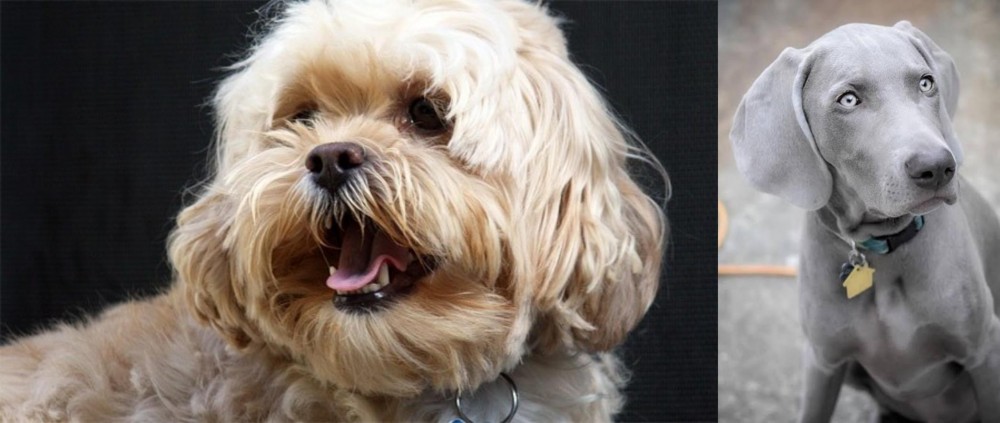 Lhasapoo is originated from United States but Weimaraner is originated from Germany. Lhasapoo may grow 42 cm / 16 inches shorter than Weimaraner. Lhasapoo may weigh 34 kg / 74 pounds lesser than Weimaraner. Both Lhasapoo and Weimaraner has almost same life span. Both Lhasapoo and Weimaraner has almost same litter size. Lhasapoo requires Moderate Maintenance. But Weimaraner requires Low Maintenance
Lhasapoo is originated from United States but Weimaraner is originated from Germany. Lhasapoo may grow 42 cm / 16 inches shorter than Weimaraner. Lhasapoo may weigh 34 kg / 74 pounds lesser than Weimaraner. Both Lhasapoo and Weimaraner has almost same life span. Both Lhasapoo and Weimaraner has almost same litter size. Lhasapoo requires Moderate Maintenance. But Weimaraner requires Low Maintenance
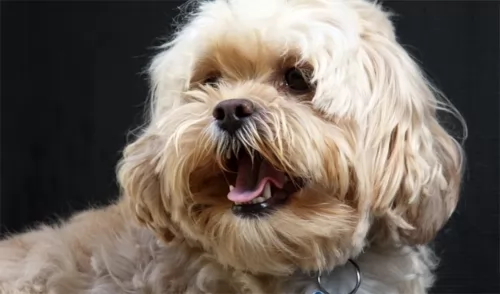 Such a cute, cuddly teddy bear of a dog is popular with everyone who just wants a wonderful canine companion.
Such a cute, cuddly teddy bear of a dog is popular with everyone who just wants a wonderful canine companion.
Both the Lhasa Apso and the Poodle are ancient dog breeds and they are the two breeds that have been used to bring about the Lhasapoo. The Poo has been bred to essentially be an indoor dog.
It would appear as though the Lhasapoo was developed in the United States of America, as in 1933, a pair was given to an American traveler who developed a kennel.
 The Weimaraner is a German breed also know as the Grey Ghost. He was bred to hunt by royalty in the early part of the 19th century. They went after large game including the bear, boar and deer. Once these large game hunts disappeared, the breed became known for hunting small prey like rabbits, fowl and fox.
The Weimaraner is a German breed also know as the Grey Ghost. He was bred to hunt by royalty in the early part of the 19th century. They went after large game including the bear, boar and deer. Once these large game hunts disappeared, the breed became known for hunting small prey like rabbits, fowl and fox.
They are an all-purpose gun dog, hunting, chasing, tracking, pointing and retrieving. They got their name from the city of Weimar in Germany as a favorite of Karl August, the Grand Duke of Saxw-Weimar-Eisenach who hunted with the dogs. They are believed to have descended from either the St. Hubert Hound and Bloodhound, or the Chien-gris dogs.
The breed did not arrive in the United States until the 1920’s. Before that they were barely known outside the city of Weimar. By the 1950’s they were very popular in the States with President Eisenhower having one at the White House.
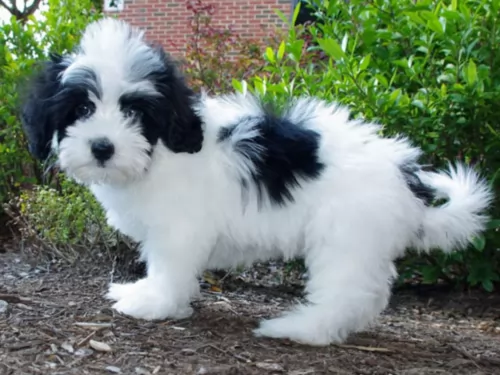 The Lhasapoo is a mix of Poodle and Lhasa Apso. He is a small dog standing between 25–28 cm in height and weighing 4 – 6kg.
The Lhasapoo is a mix of Poodle and Lhasa Apso. He is a small dog standing between 25–28 cm in height and weighing 4 – 6kg.
Known as a designer breed, his small size allows him to adapt to life in the city or to the countryside. He is such a cute little dog with his alert face, his bright brown eyes, short legs and floppy ears.
His coat is thick and dense and can be curly or fairly straight. It comes in a number of solid colors – apricot, tan, cream, brown, white and black or he can be bi-color – any of these colors mixed with white. In fact, as a crossbreed he can inherit the looks of either dogs – the Poodle or Lhasa Poo. Because he has poodle in him, these dogs are sometimes spoken about as being hypoallergenic.
Small and gentle in nature, the Lhasapoo makes a splendid pet and companion for everyone. He is such an amicable small dog, getting on well with both children and other pets in the home.
You can’t really tell what kind of a dog he’ll turn out to be in terms of his character, because he can be quite aloof if the Lhasa side of him is stronger or he could be playful and friendly if the Poodle side of him is stronger.
 A very athletic and elegant breed, muscular and lean, the Weimaraner is built for stamina and speed. They are a very unique looking breed, nick named the Grey Ghost due to the appearance and coloration. The breed has a very short coat that fits like skin over his bone structure. It is smooth and hard and runs from a blue-gray to silver-gray to charcoal-blue. The skin is pink not black, the coat is thin with no undercoat.
A very athletic and elegant breed, muscular and lean, the Weimaraner is built for stamina and speed. They are a very unique looking breed, nick named the Grey Ghost due to the appearance and coloration. The breed has a very short coat that fits like skin over his bone structure. It is smooth and hard and runs from a blue-gray to silver-gray to charcoal-blue. The skin is pink not black, the coat is thin with no undercoat.
They should not be black but they can be a longhaired Weimaraner, according to US AKC Breed Standards. In the AKC standards the tail is docked. This has now been changed in standards around the world as many countries are banning tail docking. They have webbed paws and striking amber, blue-gray or gray eyes. The long haired version can only be produced when both parents carry the recessive gene
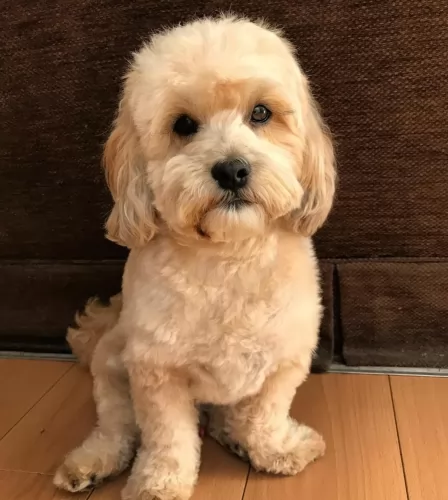 The Lhasapoo is a crossbreed, so you never know what you’re actually going to get – a little bit of Lhasa or a little bit of Poodle.
The Lhasapoo is a crossbreed, so you never know what you’re actually going to get – a little bit of Lhasa or a little bit of Poodle.
One thing is for sure though – you’re going to get the cutest little pet ever. He is a friendly, affectionate dog, but the Lhasa side of him makes him wary of strangers, making him an excellent watchdog.
They have a moderate activity levels and will adapt easily to life in the city or in the countryside, but they will need a walk every day to ensure he doesn’t become unfit and obese.
Lhasapoo puppies are adorable but every cute puppy grows into an adult. Then it’s time to show you’re a responsible dog owner by continuing to love and care for your adult Lhasapoo so that he becomes the wonderful companion he is designed to be.
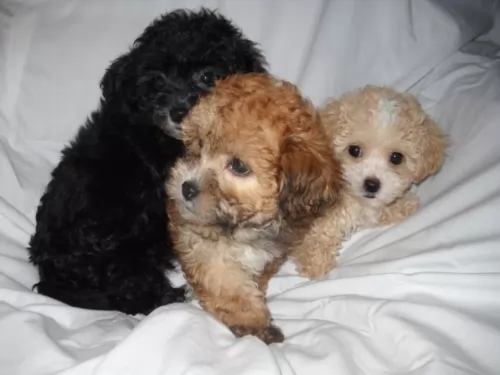 All dogs have the potential to become ill but when you give your dog the best chance to eat well and he is loved and cherished, he can live a long life.
All dogs have the potential to become ill but when you give your dog the best chance to eat well and he is loved and cherished, he can live a long life.
The Lhasapoo can live to be 15 years of age if you treat him well and ensure that he has a healthy diet. Of course as a crossbreed, his chances of developing inherited diseases is limited.
Watch out for Bloat, particularly if your pet gobbles up a large bowl of food. It is better to feed him 2 smaller meals a day. There are some time-releasing food bowls available for pets to encourage slower eating.
With Bloat, you’ll notice your pet’s stomach is swollen up. Complications set in when the stomach turns or twists as fluid and air can’t escape. Your dog will also be restless, drooling and trying to vomit. Bloat is a life-threatening illness.
This can be a complication from disease or medications even. It is important to keep your pet’s teeth healthy as chronic kidney disease can be caused by dental disease too. Bacteria from the diseased teeth and gums enters bloodstream and damages vital organs like the kidneys.
 There are a few conditions and diseases that the Weimaraner is subject to but surprisingly for their size hip dysplasia is rarely one of them. There are prone to
There are a few conditions and diseases that the Weimaraner is subject to but surprisingly for their size hip dysplasia is rarely one of them. There are prone to
Bloat – Gastric torsion when the stomach twists itself and cuts off blood circulation and digestive processes. Bloat is deadly unless caught quickly.
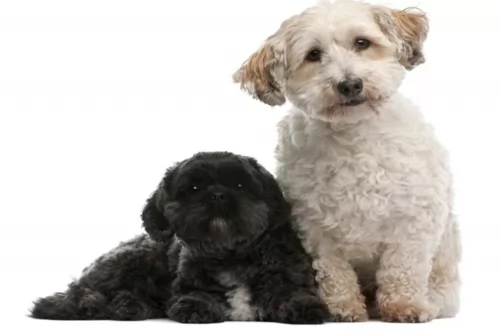 The Lhasapoo is a dog breed that likes to spend time indoors. Because of his looks, his human family members will no doubt be vying for his attention and playing indoor games with him. It will do him good to get out for a walk every day as this gives him the chance to sniff around and smell different things and experience life outside his home.
The Lhasapoo is a dog breed that likes to spend time indoors. Because of his looks, his human family members will no doubt be vying for his attention and playing indoor games with him. It will do him good to get out for a walk every day as this gives him the chance to sniff around and smell different things and experience life outside his home.
The Lhasapoo isn’t a big eater and he will require top quality food for small breeds. He isn’t a big meat eater so a tiny bit of cooked chicken, rice and vegetables chopped up nicely and added to his kibble from time to time will keep him healthy and happy.
Being the crossbreed that he is, you can’t be too sure about the type of coat your Lhasapoo will have. It can be curly, wavy or straight. Most inherit curls.
A Lhasapoo coat looks wonderful when it has been professionally groomed, and then in between grooming, his coat will need to be brushed to prevent tangling. While you’re brushing him, check his eyes too. Sometimes he can develop tear stains beneath the eyes and you can wipe gently around his eyes.
Other grooming for your cute little dog includes having his nails clipped as well as checking inside the ears for infection. Excess wax and dirt can result in an ear infection. You’ll notice your pet shaking his head, the insides of his ears might be red and he wants to scratch his ears. Get him to the vet who will show you how to keep his ears clean and dry.
Also, brush his teeth with special canine toothbrush and toothpaste. Dental disease won’t only damage his teeth, it can cause problems with other parts of the body too.
 1 Feeding the puppy - Feed high quality dog food with high protein but not rich foods. Rich foods cause digestive issues and eating to fast, too soon before or after strenuous exercise do to threat of bloat. Also do not use the raised foot bowls as they hold an even great risk for bloat. Feed puppy 3-4 meals per day.
1 Feeding the puppy - Feed high quality dog food with high protein but not rich foods. Rich foods cause digestive issues and eating to fast, too soon before or after strenuous exercise do to threat of bloat. Also do not use the raised foot bowls as they hold an even great risk for bloat. Feed puppy 3-4 meals per day.
2.Feeding the adult Feed high quality dog food with high protein but not rich foods. Rich foods cause digestive issues and eating to fast, too soon before or after strenuous exercise do to threat of bloat. Also do not use the raised foot bowls as they hold an even great risk for bloat. Feed the adult twice a day.
4. Games and Exercises – This is a very athletic and energetic dog. They need activity and will become destructive without it. They develop separation anxiety very easily. They need both physical and mental stimulation. They are great at agility, course running, field trials and CAT.